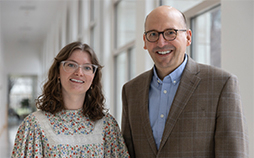Social Connection Is Vital to Physical Health
September 2025

New BYU studies reveal that both the public and healthcare providers often overlook social connection as a key factor in physical health, even though loneliness rivals smoking and obesity in health risks.
Research confirms that social isolation and loneliness significantly impact health and mortality, even if not listed on death certificates. BYU psychology and neuroscience professor, Julianne Holt-Lunstad, has published extensively on the topic.
Social connection is now a legitimate health factor, but Holt-Lunstad and doctoral student, Andrew Proctor, recently published two studies showing that most of us—the general population and medical providers—still don’t think social connection affects physical health. And even the professionals who recognize the importance report that they don’t have time or tools to help patients address social concerns.
Proctor, explained that before the study, they had been watching how the pandemic was influencing internet searches around the topics of isolation and loneliness.
“I have a marketing background, so I thought that maybe the public perception had changed since COVID. Social distancing, isolation and loneliness were huge buzzwords on the internet… We wondered if perceptions about social connection had changed,” says Proctor.
They surveyed 2,392 people from the US, UK and Australia about their perceptions of health risks associated with isolation and loneliness. The data showed that people still underestimate the importance of social connection for physical health.
“The study identified blind spots in medical care,” says Proctor. “Social connection is like a vital sign… We just don’t tend to recognize it.”
In a closely connected study, Holt-Lunstad and Proctor, along with coauthors, surveyed 681 healthcare providers (primarily doctors) about perceptions of health risks associated with poor social connection. Similar to the general population from the first study, healthcare providers underestimated social connection as a medically relevant health factor.
“We completed the data collection at two different time points. Our first cohort was healthcare providers through the University of Utah Health System. Slightly later, we had a second major cohort of University of California San Francisco (UCSF) physicians,” says Holt-Lunstad. “What was interesting is that the perceived importance of social factors was a bit higher among the UCSF group.”
The authors attribute the higher awareness at UCSF to the University’s Social Interventions Research and Evaluation Network as well as the publication of the 2023 Surgeon General’s Advisory, which came out just before the second cohort was surveyed. This suggests that social initiatives as well as institutional support make a difference in the perceived importance of social connection.
“What I hope is that these studies can spur recognition that there is a body of evidence showing social connection as medically relevant. Awareness can make a difference,” says Holt-Lunstad. “It’s the first step, but awareness isn’t enough.”



